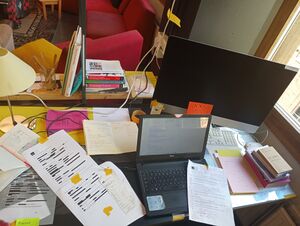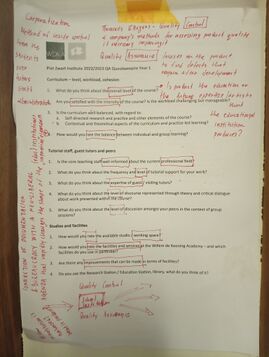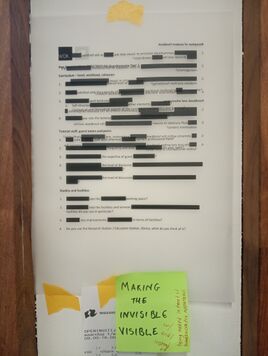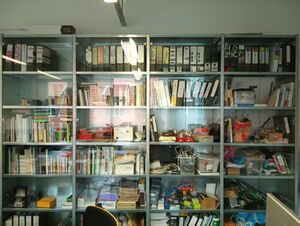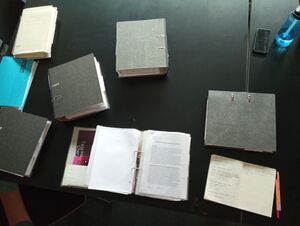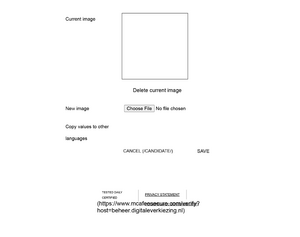Thesis, STORIES OF(DIS)PLACEMENT AND BUREAUCRACY, performing the papaerwork borderline
Working with the thesis - T E X T
Session 1 Seminar Thesis
1 What do you want to make?
I would like to explore the bureaucratic rituals inside the educational institution I am currently part as a master’s student. The case of wdka. How bureaucratic rituals change through years inside this institution and how (or if) these changes are related at some point with european/dutch policies around (migration) movement and border/migration control? How the transformation of the institution itself is depicted/implied through/in bureaucracy or established by these kind of dramaturgies. What are these dramaturgies about? My intention is to navigate, access and look through the administration documents, the bureaucratic ritualist apparatus, the way this apparatus usually looks at me, inside my (privileged) soul and other’s people souls. How bureaucracy constitute a border that needs to be performed and what does it mean not to be performed efficiently. The grey cold zone of visibility/invisibility of this border, the vulnerability created and the urgency to start putting it again on the table.
What do you mean the document is not universal and neutral?
There is no document of civilisation which is not at the same time a document of barbarism , Benjamin
2 How do you plan to make it?
I am planning to do a small field research by collecting and looking through the archive of documents that administration holds through the years and dive into the plain text and the structure of these paperwork. What made the potential students to become officially students and what went wrong with the ones that didn’t make it? How the amount of the paperwork changes and to which direction? What does it happen with the validity of the documents and who is in charge of? Try to find a brief history of the requirements and to become as student and the
3 What is your timetable?
October
- reading and annotating rituals
- look for potential material in my communication with administrators when applying
- ask peers and other students about their experience or administration stories. How does this work onto their document?
- investigating the structure and aesthetic of the forms that you borrowed from Leslie. Make a potential timeline of the forms and see how they transformed through the years. Make an archive.
- structure the interview with course coordinator (Leslie <3)
- interview moment and transcription
- make and play with my forms and distribute them. Work with bureaucratic literature for fun and for inspiration and to open questions behind bureaucratic language aesthetics, inaccesibility, predetermined ways of reading understanding. Back again to the dusty piles of paper
- Always checking if I still have a question.
November
- reading and annotating rituals
- prepare my forms for zine camp and Leeszaal Leeszaal event
- zine camp 5-6/11/2023
- Leeszaal moment 7/11/2023
- thesis outline 17/11/2023
- November 21, 15:00 – 17:00 go to INSTITUTE’S PARTICIPATION COUNCIL (IMR) and keep notes
- Investigation of the some governmental text, law, language. Be careful not to aesthetisize bureaucracy!
- structure the interview with administrator(s)of coia
- interview moment and transcription
- make and play with my forms and distribute them. See what is there.
- Always checking if I still have a question.
(...)
December
- reading and annotating rituals
- make and play with my forms and distribute them.
- assessment 11/12/2023
- notetaking on assessment 11/12/2023
- Always checking if I still have a question.
(...)
January
- reading and annotating rituals
- make stamp – form
(...)
February
reading and annotating rituals
(...)
March
reading and annotating rituals
(...)
April
reading and annotating rituals
(...)
May
(...)
June
(...)
4 Why do you want to make it?
5 Who can help you and how?
- Tutors,
- Leslie
- xpub friends,
- administrators of wdka, piet zwart, coia and probably
6 Relation to previous practice
7 Relation to a larger context8 Potential References/bibliography- Archive Public
- Archive : Ariella Azoulay
- The dispossessed Ursula Le Guin
- Peter Principle
- The hopeless university
- Bourdieu: a social critique of judgment of taste
- writing machines katharine hayles
- (A cyborg manifesto Donna haraway)
- Archive Fever: a freudian impression Deridda
- (Forced) Movement
- Madeline Gins The Saddest Thing is that I Have Had to Use Words
- Karen Brodine Woman Sitting at the machine Thinking
- Radical Administration Festival brochure 2020
- Ursula Biemann Perrforming the Border documentary
- The Utopia of Rules: On Technology, Stupidity, and the Secret Joys of Bureaucracy, David Graeber
- the castle kafka
- Governing Asylum without “Being There”: Ghost Bureaucracy, Outsourcing, and the Unreachability of the State
- Ruben Pater CAPS - the good citizen
- The Tyrany of transparency Marilyn Strathern
- https://www.mdpi.com/2076-0760/12/3/169
- Ariella Azouay Un-Documented – Unlearning Imperial Plunder documentary
possibly useful links
- https://www.government.nl/topics/asylum-policy/tackling-the-refugee-problem
- https://www.government.nl/topics/asylum-policy/tackling-the-refugee-problem/support-to-greece-for-unaccompanied-minors
- https://asylumineurope.org/wp-content/uploads/2017/03/report-download_aida_nl_update.v_final.pdf
- https://greece.refugee.info/en-us/articles/4984594750615
- https://el.wikipedia.org/wiki/%CE%9A%CE%B1%CE%BD%CE%BF%CE%BD%CE%B9%CF%83%CE%BC%CF%8C%CF%82_%CE%94%CE%BF%CF%85%CE%B2%CE%BB%CE%AF%CE%BD%CE%BF%CF%85
- https://www.talkingobjectslab.org/about
- IMR OC https://static.mywdka.nl/wdka/boards/institutes-participation-council/
- https://www.nuffic.nl/en
Session 3 Seminar Thesis - Working on the text
I would like to explore the bureaucratic dramaturgies (including paperwork and (de-)established rituals) inside the educational institution I am currently part as a master’s student. The case of wdka. How bureaucratic rituals change through years inside this institution, transform or reshape it quietly (into ???) and how (or if) these changes are related at some point with european/dutch policies around (migration) movement and border/migration control? (The archive that I am going to investigate will possibly define how far in time I can go.) How the transformation of one institution itself is depicted/implied through/in bureaucracy or established by these kind of dramaturgies. What are these dramaturgies about? My intention is to navigate, access and look through the administration documents, the bureaucratic ritualist apparatus, the way this apparatus usually looks at me, inside my (privileged) soul and other’s people souls. How bureaucracy constitute a border that needs to be performed and what does it mean not to be performed efficiently. The grey cold zone of visibility/invisibility of this border, the vulnerability created and the urgency to start putting it again on the table.
I am planning to do a small field research by collecting and looking through the archive of documents that administration of our department holds through the years and dive into the plain text and the structure of these paperwork. What made the potential students to become officially students and what went wrong with the ones that didn’t make it? How the amount of the paperwork changes and to which direction? What does it happen with the validity of the documents and who is in charge of? Try to find a brief history of the requirements to become a student and the transformation on the amount or quality of those through time.
three potential keys:
1. BUREAUCRATIC APPARATUS AS IMMATERIAL BORDER. What is border and what bureaucracy? How bureaucracy can constitute a border? What it means to be documeneted and what inefficiently documenetd? The tyranny of transparency and the supposed neutrality of the form. Talking about the bureaucratic aesthetic and the potential beheaviour that (re)produces. How even an educational institution/a fine art school can reflect a government’s /state’s rules on migration policies, control, security etc (too heavy??!)
2. THE CASE OF WDKA: field research, documents throught the years and how you can relate this transformation, interviews with administrators and students. Create an counter-archive of these edited documents working as testimonies/as proof of the transformation that the institution is undergoing. Talk about this assumption. Attempt to put things on the table and discuss about infrastructure. (I should put some constraints on this research and look more specifically the case of eu and non eu since it seems to me that is deeply or more directly related with the policies behind the migration/border control)
3. THE INTIMATE STORY IN RELATION TO THE DOCUMENT. Bureaucratic dramaturgies and how you can find (or loose) yourself in them. Vulnerability and bureaucracy. The story of (dis-mis-counter)placement. The bureaucratic language/text in relation to the personal gaze over this text. The personal story or experience that disrupts the continuity of the form. How a structured form can become a (plain) text and an entry for an ongoing discourse or even conflict. Interviews or annotations or stories or filled misfunctional forms and how people (piet zwart community or basically students) correspond/manoeuvre/hack/mis-read/destroy/mis-use/ fake/mess with a (given) form/a document.
Session 4 : Working on 3 texts of the bibliography
PAD: https://pad.xpub.nl/p/aglaia_thesis_workplace
Project - small prototypes
Prototype 1: Booklet of XPUB students 2023-2024
Prototype 2: notetaking and censoring of the Questionnaire of Quality Assurance Meeting
(from the small talk with Leslie)
Hogeschool works with this company that is in charge of the control of the diplomas and this kind of paperwork through excessive controls and checks. This is something pretty new. It didn’t really exist a decade ago. There were barely checks. The amount of documentation is asked from the potential students (in non-eu case is disproportionate) is radically increased. How bureaucratic rituals change through years (in the educational institutions) and how these changes reflect the european/dutch policies around (migration) movement and border control in the non eu case?
The small case of the Quality Assurance ritual. How new bureaucratic rituals are established and transform quietly the institution. I conceived the QA moment as way of an inner control through the gaze of the students this time.
One of the primary differentiations in QA vs. QC is where the focus of the work lies. QA primarily focuses on the processes and procedures that improve quality, including training, documentation, monitoring and audits. QC focuses on the product to find defects that remain after development.
I went through this document (questionaire for QA) that was sent to us a couple of weeks ago, in order to prepare ourselves for the upcoming meeting. I printed annotated and then censored this document. I tried to keep the words/ phrases that imply accountability
“Higher education professionals at once accede to the idea of accountability and performance indicators as highly constructed and artificial means of measuring output.” (Tyranny of Transparency)
MEASUREMENTS BECOMES THE AIM
Prototype 3 : Looking through the lens of the student's documents of XPUB 2002-2023, spying on Leslie's archive
Prototype 4 (Ongoing) : Candidancy to spy IMR
https://kandidaten.digitaleverkiezing.nl/candidate/
i h a v e t o w o r k w i t h m y c a m p a i g nPrototype 5 (Ongoing) : Playing with my forms (forced memory story form rituals)
Rapid Prototype Session 2#Aglaia
to add the code of the random daily form website that you made

